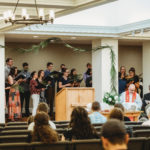Trinity’s choir is congregational and has no audition process.
 Anyone can join choir and musical background is not a prerequisite. Tangents on music theory and music history are not uncommon occurrences, so an allergy to nerdiness will likely be an implacable barrier to joining choir. But, if an atmosphere of musical geekiness is a negotiable downside, you may just need to try it out. For more information and to get involved, you can contact Sara Appel at mrsappel@nullgmail.com or Joshua Roberts at jroberts@nulltrinitykirk.com.
Anyone can join choir and musical background is not a prerequisite. Tangents on music theory and music history are not uncommon occurrences, so an allergy to nerdiness will likely be an implacable barrier to joining choir. But, if an atmosphere of musical geekiness is a negotiable downside, you may just need to try it out. For more information and to get involved, you can contact Sara Appel at mrsappel@nullgmail.com or Joshua Roberts at jroberts@nulltrinitykirk.com.
Choir sings at 8:30am and 11:00 am Sunday services and rehearses Wednesday evenings at 6:30pm.
 Trinity’s choir rehearsal begins at 6:30pm on Wednesday night and ends promptly at 8:00pm. Kid-friendly dinner is also hosted at the Trinity’s Fellowship Hall, starting 5:15pm.
Trinity’s choir rehearsal begins at 6:30pm on Wednesday night and ends promptly at 8:00pm. Kid-friendly dinner is also hosted at the Trinity’s Fellowship Hall, starting 5:15pm.
Adult choir also comes with Trinity’s staff of child care providers, so if married couples with kids wish to join choir, there is as little obstacle as possible. All child care providers have been thoroughly interviewed and background-checked.
Sunday mornings don’t have to be too hectic and a chorister can attend either of Trinity’s two services. Those who attend the first service will have to stay until the beginning of the second service and will likely be done by 11:15am. Those who attend the second service will have to arrive early to sing at about 8:30am and can go home until the next service.
Trinity’s adult choir sings a lot of great music and doesn’t even bother to exclude living composers.
 Trinity’s adult choir is most at home in the early music of post-Reformation England, early Lutheran music, and some early American choral music. Josquin, Tallis, Byrd, Purcell, and Billings are among the most common selections.
Trinity’s adult choir is most at home in the early music of post-Reformation England, early Lutheran music, and some early American choral music. Josquin, Tallis, Byrd, Purcell, and Billings are among the most common selections.
Adult choir also sings with the children’s choir at Trinity’s Lessons & Carols service and Trinity’s Easter Choral Evensong service every year. These services include harder, large-scale choral works and have featured the works of modern composers including Pawel Lukaszewski, James MacMillan, and John Taverner, as well as much of the traditional music of the Anglican church such as Hubert Parry, Herbert Howells, Ralph Vaughan Williams, and David Willcocks.
Trinity’s special services often feature out-of-town organists, guest conductors, and the best that local Moscow venues have to offer.


